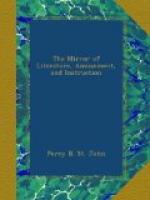To Bacchus, his saint, our dejected recruit.
One morn, about drill time, thus proffer’d
his suit—
“Oh make me a sparrow, a wasp, or
an ape—
All’s one, so I get at the juice
of the grape.”
The God was propitious—he instantly
found
His ten toes distend and take root in
the ground;
His back was a stem, and his belly was
bark,
And his hair in green leaves overshadow’d
the Park.
Grapes clustering hung o’er his
grenadier cap,
His blood became juice, and his marrow
was sap:
Till nothing was left of the muscles and
bones
That form’d the identical toper,
Jack Jones.
Transform’d to a vine, he is still
seen on guard,
At his former emporium in Great Scotland-yard;
And still, though a vine, like his fellow-recruits,
He is train’d, after listing, his
ten-drills, and shoots.
New Monthly Magazine.
* * * * *
THE SELECTOR; AND LITERARY NOTICES OF NEW WORKS.
* * * * *
THE JUVENILE KEEPSAKE,
Edited by Mr. Thomas Roscoe, and dedicated to Professor Wilson, is no less attractive than its “Juvenile” rivals. Indeed, a few of the tales take a higher range than either of theirs,—as the Children’s Island, an interesting Story, from the French of Madame Genlis; the Ball Dress; the Snow Storm; and the Deserted Village. The Heir of Newton Buzzard, a Tale in four cantos, by the late Mrs. John Hunter, is perhaps one of the prettiest juvenile novelties of the season. It is divided into Infancy—Childhood—Boyhood—and Youth—all which contain much amusement and moral point without dulness. We have not room for an entire story, but select one of Miss Mitford’s village portraits:
“Dash was as beautiful a dog as eyes could be set on; one of the large old English Spaniels which are now so rare, with a superb head, like those which you see in Spanish pictures, and such ears! they more than met over his pretty spotted nose; and when he lapped his milk, dipped into the pan at least two inches. His hair was long and shiny and wavy, not curly, partly of a rich dark liver colour, partly of a silvery white, and beautifully feathered about the thighs and legs. He was extremely lively and intelligent, and had a sort of circular motion, a way of flinging himself quite round on his hind feet, something after the fashion in which the French dancers twist themselves round on one leg, which not only showed unusual agility in a dog of his size, but gave token of the same spirit and animation which sparkled in his bright hazel eye. Anything of eagerness or impatience was sure to excite this motion, and George Dinely gravely assured his sisters, when they at length joined him in the hall, that Dash had flung himself round six and twenty times whilst waiting the conclusion of their quarrel.




